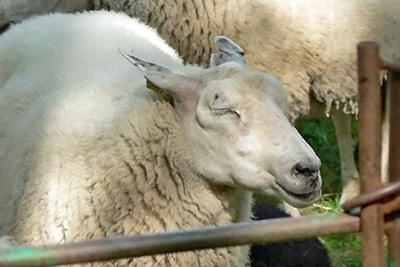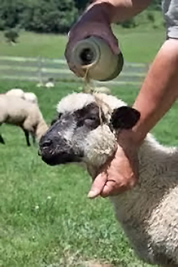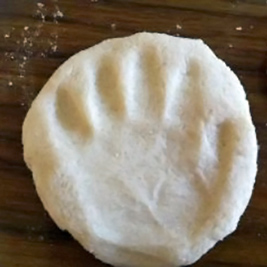ANOINT MY HEAD WITH OIL – PSALM 23 — Part 13
UNGIR MI CABEZA CON ACEITE – SALMOS 23 — Parte 13
By Mary Hunt Webb
Posted Saturday, September 15, 2012

Wearing a cap helps to keep cotton that is soaked with olive oil in a child's ear. [Photographer: unidentified. Photo courtesy of Stockvault.net.]
Psalm 23:5 "You prepare a table before me in the presence of my enemies; You anoint my head with oil; My cup runs over." (New King James Version)
Salmos 23:5 "Aderezas mesa delante de mí en presencia de mis angustiadores; Unges mi cabeza con aceite; mi copa está rebosando." (Reina-Valera 1960)
It doesn't seem that long ago that a public school classroom in winter was likely to contain at least one child wearing a piece of cotton in his or her ear. When one child was asked why he had cotton in his ear, he replied, "I had an earache so Mama put olive oil on the cotton and put it in my ear. She said I have to wear it all day."
Olive oil? Does olive oil contain healing properties?
One only has to turn to the Parable of the Good Samaritan in Luke 10:25–37 for the answer. (To read the entire passage from the Bible, I have included it in English and Spanish at the very end of this posting. *) In a conversation with Jesus, the lawyer asked Him what he must do to inherit eternal life. Jesus asked the lawyer what the law said, and the lawyer replied, "…'You shall love the Lord your God with all your heart, with all your soul, with all your strength, and with all your mind,' and 'your neighbor as yourself.'" (John 10:27, New King James Version)
Then the lawyer asked Jesus who his neighbor was. Jesus responded with the story of a man that was traveling from Jerusalem to Jericho when thieves attacked him, stripped him of his clothes, beat him up, and left him near death. When various Jewish leaders traveled by and saw him lying in agony by the road, they did not stop to help the wounded man. Instead, they passed by him.
However, a Samaritan saw him and stopped to help him. This was significant because the Samaritans and the Jews did not have anything to do with each other. However, the compassion of the Samaritan overcame cultural animosity.
Now Luke 10:34 is the verse that concerns us. Speaking of the Samaritan, it says, "So he [the Samaritan] went to him [the injured man] and bandaged his wounds, pouring on oil and wine; and he set him on his own animal, brought him to an inn, and took care of him."
This is an important verse because it describes the medicinal use of wine as a topical antiseptic and the application of oil to begin the healing process. The oil that everyone used in those days was olive oil. They didn't just eat it and use it in cooking; they applied it as a topical balm to promote healing. Among other properties, olive oil reduced swelling, prevented infection, and kept parasites and fungus away.
Remember the earlier account of the school child with cotton soaked in olive oil in his ear? In earlier days, a mother put warm olive oil (not hot oil) on cotton in her child's ear to relieve swelling of the Eustachian tube and to reduce the pain. Although I knew of this application as a folk remedy from the past, I found a more current reference to this practice in a book entitled, Bottom Line's Secret Food Cures & Doctor-Approved Folk Remedies by Joan Wilen and Lydia Wilen (p. 64, New York: Ballantine Books, 2009). While this is not a recommendation of this technique, the application of a small dab of olive oil is not toxic and will not harm the ear.

Is that a blemish on the eyelid of this sheep, or is it an insect waiting for an opportunity to enter the ear or nose of this peaceful animal? [Photographer: Magnus Rosendahl. Photo courtesy of Public-domain-photos.com.]
What holds true for home remedies for people also holds true for the health maintenance of animals. In Bible times, shepherds used what they had, and what they had was olive oil. Today they still use oil for the health care of animals although it is not always olive oil. Sometimes they use oil of oregano, linseed oil, or some other type of oil. Sheep owners apply oil topically to the ears and noses of their flock to prevent the entrance of flies and other pests that try to enter the sheep and infect them. Although advice also exists regarding administering food-grade oil internally, we are concerned here primarily with external application.
Rather than limiting the application of oil to just the ears and nose, the shepherd was aware that lice and other parasites live on the skin and in the wool of sheep. Such parasites were there to await the first possible entrance into the sheep's anatomy. If parasites found an entrance into the sheep, they could enter the sheep's brain. The sheep would try to rid itself of the growing parasite by hitting its head against solid objects, but to no avail. Eventually, the parasite caused the death of the sheep. Therefore, the shepherd applied oil to the entire head of each animal in order to deny entry to parasites.

Since parasites live on the skin and in the wool of sheep, the shepherd applies oil to the entire head of each animal. [Photographer: Unknown. Photo courtesy of of SoulShepherding.org.]
In Psalm 23:5b, David said of the Lord, "You anoint my head with oil." To anoint means to apply oil, often with a rubbing or smearing motion. The application of oil is for the purpose of protecting a valuable life because the oil presents a slippery surface in which parasites and pests cannot live.
The spiritual analogy for us, as humans, is that we receive God's vigilant protection when we belong to Him and claim Him as our Shepherd. That protection is part of being a member of His flock. Although the devil may attempt to attack us, he cannot harm us because we have the spiritual protection of God's anointing. (If you have not yet prayed to receive the Lord as your Heavenly Shepherd, please see the August 27, 2012 posting entitled, "A TABLE PREPARED".)
The physical application of olive oil to believers is an affirmation of what has already happened. There is no magic in the oil. Its application merely affirms the claim of the believer to the rights that belong to members of God's flock.
While multiple references to anointing with oil for special purposes can be found in the Bible, the reference to healing and protection in Psalm 23 is in keeping with the animal-based analogy of a sheep that is dependent on its shepherd.
Like those dependent sheep, we can depend on our Heavenly Shepherd to care for us beyond our capacity to care for ourselves. God knows our needs better than we do. We have only to trust Him. If you find that difficult to do, ask Him to help you to do so.
A simple prayer will do, such as this one: "Dear Lord, Thank You for loving me and for caring for me. Psalm 23:5 tells me that, as my Shepherd, You are watching over me in ways I cannot understand. You are my Protector. Please help me to understand that. Help me to trust that You are watching over me so that I don't have to do everything myself. I am starting to realize that I have needs that You understand better than I do. Thank You for protecting me and for helping me to grow spiritually and emotionally as well as physically. It has always been difficult for me to trust anybody. Please help me to trust You. I pray this in the name of Jesus, Amen."
BIBLE VERSES FOR THIS POSTING
Psalm 23:5 You prepare a table before me in the presence of my enemies; You anoint my head with oil; My cup runs over." (New King James Version)
Salmos 23:5 "5) Aderezas mesa delante de mí en presencia de mis angustiadores; Unges mi cabeza con aceite; mi copa está rebosando." (Reina-Valera 1960)
Luke 10:34 "So he went to him and bandaged his wounds, pouring on oil and wine; and he set him on his own animal, brought him to an inn, and took care of him." (New King James Version)
Lucas 10:34 "Se acercó a él, le curó las heridas con aceite y vino, y le puso vendas. Luego lo subió en su propia cabalgadura, lo llevó a un alojamiento y lo cuidó." (Dios Habla Hoy)

Learning to trust the Lord is part of one's spiritual growth as a Christian. [Photographer: Melissa Nicklen. Photo courtesy of Stockvault.net.]
Psalm 23 — 1) The Lord is my shepherd. I shall not want. 2) He makes me to lie down in green pastures; He leads me beside the still waters. 3) He restores my soul; He leads me in the paths of righteousness For His name's sake. 4) Yea, though I walk through the valley of the shadow of death, I will fear no evil; For You are with me; Your rod and Your staff, they comfort me. 5) You prepare a table before me in the presence of my enemies; You anoint my head with oil; My cup runs over. 6) Surely goodness and mercy shall follow me All the days of my life; And I will dwell in the house of the LORD Forever." (New King James Version)
Salmos 23 — 1) Jehová es mi pastor; nada me faltará. 2) En lugares de delicados pastos me hará descansar; Junto a aguas de reposo me pastoreará. 3) Confortará mi alma; Me guiará por sendas de justicia por amor de su nombre. 4) Aunque ande en valle de sombra de muerte, No temeré mal alguno, porque tú estarás conmigo; Tu vara y tu cayado me infundirán aliento. 5) Aderezas mesa delante de mí en presencia de mis angustiadores; Unges mi cabeza con aceite; mi copa está rebosando. 6) Ciertamente el bien y la misericordia me seguirán todos los días de mi vida, Y en la casa de Jehová moraré por largos días." (Reina-Valera 1960)
* The Parable of the Good Samaritan
Luke 10:25-37 — 25) And behold, a certain lawyer stood up and tested Him, saying, "Teacher, what shall I do to inherit eternal life?" 26) He said to him, "What is written in the law? What is your reading of it?" 27) So he answered and said, "'You shall love the LORD your God with all your heart, with all your soul, with all your strength, and with all your mind,' and 'your neighbor as yourself.'" 28) And He said to him, "You have answered rightly; do this and you will live." 29) But he, wanting to justify himself, said to Jesus, "And who is my neighbor?" 30) Then Jesus answered and said: "A certain man went down from Jerusalem to Jericho, and fell among thieves, who stripped him of his clothing, wounded him, and departed, leaving him half dead. 31) Now by chance a certain priest came down that road. And when he saw him, he passed by on the other side. 32) Likewise a Levite, when he arrived at the place, came and looked, and passed by on the other side. 33) But a certain Samaritan, as he journeyed, came where he was. And when he saw him, he had compassion. 34) So he went to him and bandaged his wounds, pouring on oil and wine; and he set him on his own animal, brought him to an inn, and took care of him. 35) On the next day, when he departed, he took out two denarii, gave them to the innkeeper, and said to him, 'Take care of him; and whatever more you spend, when I come again, I will repay you.' 36) So which of these three do you think was neighbor to him who fell among the thieves?" 37) And he said, "He who showed mercy on him." Then Jesus said to him, "Go and do likewise." (New King James Version)
* El buen samaritano
Lucas 10:25-37-25) — Un maestro de la ley fue a hablar con Jesús, y para ponerlo a prueba le preguntó; —Maestro, ¿qué debo hacer para alcanzar la vida eterna? 26) Jesús le contestó: —¿Qué está escrito en la ley? ¿Qué es lo que lees? 27) El maestro de la ley contestó: —"Ama al Señor tu Dios con todo tu corazón, con toda tu alma, con todas tus fuerzas y con toda tu mente"; y, "ama a tu prójimo como a ti mismo." 28) Jesús le dijo: —Has contestado bien. Si haces eso, tendrás la vida. 29) Pero el maestro de la ley, queriendo justificar su pregunta, dijo a Jesús: —¿Y quién es mi prójimo? 30) Jesús entonces le contestó: —Un hombre iba por el camino de Jerusalén a Jericó, y unos bandidos lo asaltaron y le quitaron hasta la ropa; lo golpearon y se fueron, dejándolo medio muerto. 31) Por casualidad, un sacerdote pasaba por el mismo camino; pero al verlo, dio un rodeo y siguió adelante. 32) También un levita llegó a aquel lugar, y cuando lo vio, dio un rodeo y siguió adelante. 33) Pero un hombre de Samaria que viajaba por el mismo camino, al verlo, sintió compasión. 34) Se acercó a él, le curó las heridas con aceite y vino, y le puso vendas. Luego lo subió en su propia cabalgadura, lo llevó a un alojamiento y lo cuidó. 35) Al día siguiente, el samaritano sacó el equivalente al salario de dos días, se lo dio al dueño del alojamiento y le dijo: "Cuide a este hombre, y si gasta usted algo más, yo se lo pagaré cuando vuelva." 36) Pues bien, ¿cuál de esos tres te parece que se hizo prójimo del hombre asaltado por los bandidos? 37) El maestro de la ley contestó: —El que tuvo compasión de él. Jesús le dijo: —Pues ve y haz tú lo mismo. (Dios Habla Hoy)
